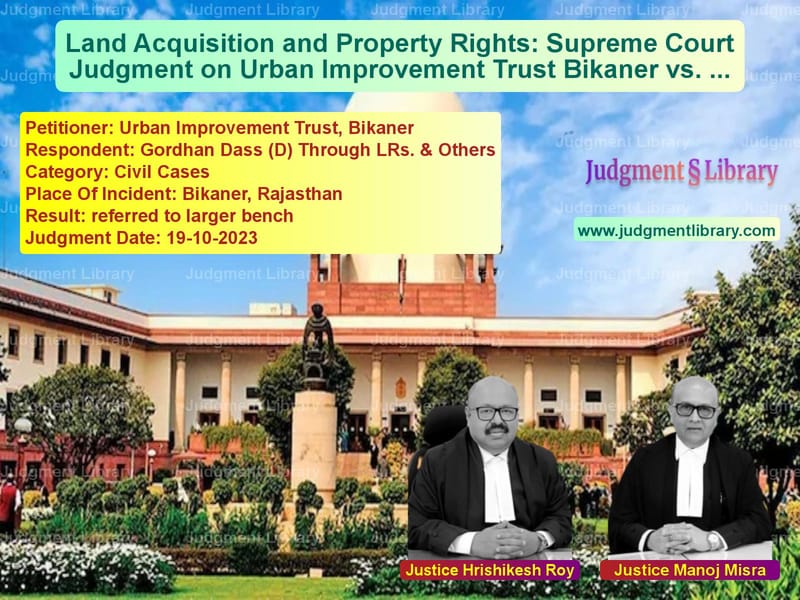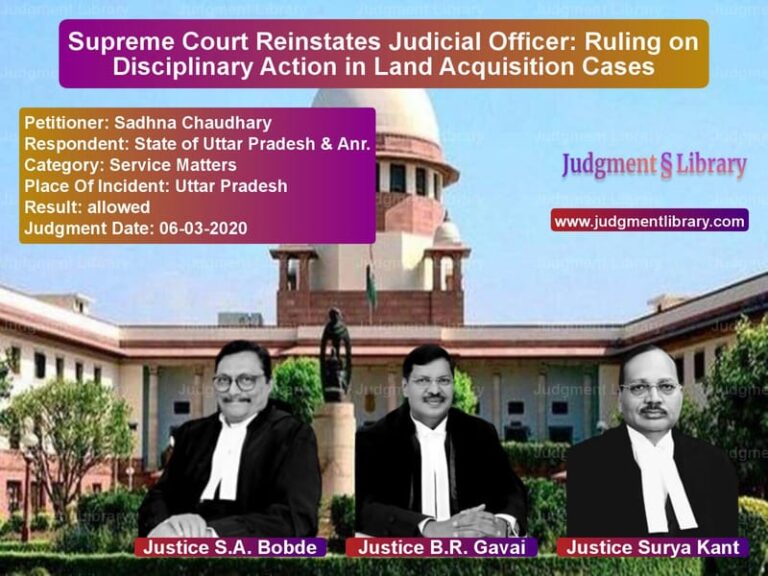Land Acquisition and Property Rights: Supreme Court Judgment on Urban Improvement Trust Bikaner vs. Gordhan Dass
The case of Urban Improvement Trust, Bikaner vs. Gordhan Dass revolves around the contentious issue of land acquisition and the rights of property owners under the law. The judgment delivered by the Supreme Court of India on October 19, 2023, addressed significant legal questions regarding procedural fairness in land acquisition, the right to receive proper notice, and the role of civil courts in adjudicating such disputes.
At the core of the dispute is a land acquisition by the Urban Improvement Trust (UIT), Bikaner, under the Rajasthan Urban Improvement Trust Act, 1959. The respondents, led by Gordhan Dass, had purchased three bighas of land in Bikaner town through registered sale deeds in 1970. However, when the UIT attempted to take possession of the land, the respondents challenged the acquisition, claiming that no proper legal procedure was followed.
Background of the Case
The land in question was jointly purchased by the plaintiff and defendant nos. 2 to 4 through registered sale deeds dated March 2, 1970, and March 16, 1970. Out of the total land, one bigha was converted into non-agricultural land for setting up a petrol pump, for which the District Collector issued an NOC in 1971.
The key contentions of the respondents (plaintiffs) were:
- The UIT had not acquired the land lawfully.
- Proper notice was not served upon them before the acquisition.
- The landowners were not given any opportunity to be heard.
- Compensation was not provided.
The appellant (UIT Bikaner) argued that:
- The land acquisition process followed legal procedures.
- Notice was served to the recorded Khatedars.
- Compensation had been paid.
- The suit was barred under the Rajasthan Tenancy Act, 1955.
Judicial Proceedings and Findings
Trial Court Decision
The trial court ruled that the plaintiff was entitled to one bigha of land, as it was not part of the acquired property. However, for the remaining two bighas, the court held that the UIT had followed the proper acquisition process.
First Appellate Court Decision
The respondents filed an appeal, and the first appellate court ruled entirely in their favor. The court found that:
- The UIT had knowledge of the plaintiffs’ ownership through prior dealings, such as the NOC for the petrol pump.
- No proper notice was served to the actual owners.
- The acquisition process was illegal, and possession should be restored.
High Court Decision
The High Court upheld the appellate court’s decision, ruling that the land acquisition was null and void due to the lack of notice to the real owners. The court also held that a civil suit was maintainable despite the UIT’s objections.
Supreme Court Verdict
The Supreme Court bench, comprising Hrishikesh Roy and Manoj Misra, delivered split judgments:
- Justice Hrishikesh Roy: Dismissed the appeal, holding that the acquisition process was invalid due to the violation of procedural fairness.
- Justice Manoj Misra: Allowed the appeal, holding that the acquisition process was legal and that the civil suit was not maintainable.
Due to the split decision, the matter was referred to a larger bench.
Key Legal Takeaways
1. Importance of Procedural Fairness in Land Acquisition
The judgment reinforces that any land acquisition must strictly follow statutory requirements. The failure to notify actual landowners violates their constitutional rights under Article 300A of the Indian Constitution.
2. Role of Civil Courts in Land Acquisition Disputes
The case highlights a significant legal debate on whether civil courts have jurisdiction over land acquisition disputes. While the appellants argued that the Rajasthan Tenancy Act barred such suits, the respondents successfully contended that procedural violations allowed them to approach the civil court.
3. Right to Compensation and Fair Notice
The Supreme Court reaffirmed that notice and fair compensation are indispensable in any land acquisition process. The failure to serve notice to the actual owners rendered the acquisition invalid.
Conclusion
This case serves as a crucial precedent in property law, particularly in disputes involving land acquisition by government bodies. It underscores the importance of following due process and protecting the rights of landowners against arbitrary state action.
Petitioner Name: Urban Improvement Trust, Bikaner.Respondent Name: Gordhan Dass (D) Through LRs. & Others.Judgment By: Justice Hrishikesh Roy, Justice Manoj Misra.Place Of Incident: Bikaner, Rajasthan.Judgment Date: 19-10-2023.
Don’t miss out on the full details! Download the complete judgment in PDF format below and gain valuable insights instantly!
Download Judgment: urban-improvement-tr-vs-gordhan-dass-(d)-thr-supreme-court-of-india-judgment-dated-19-10-2023.pdf
Directly Download Judgment: Directly download this Judgment
See all petitions in Property Disputes
See all petitions in Landlord-Tenant Disputes
See all petitions in Specific Performance
See all petitions in Damages and Compensation
See all petitions in Judgment by Hrishikesh Roy
See all petitions in Judgment by Manoj Misra
See all petitions in Referred to Larger Bench
See all petitions in supreme court of India judgments October 2023
See all petitions in 2023 judgments
See all posts in Civil Cases Category
See all allowed petitions in Civil Cases Category
See all Dismissed petitions in Civil Cases Category
See all partially allowed petitions in Civil Cases Category







